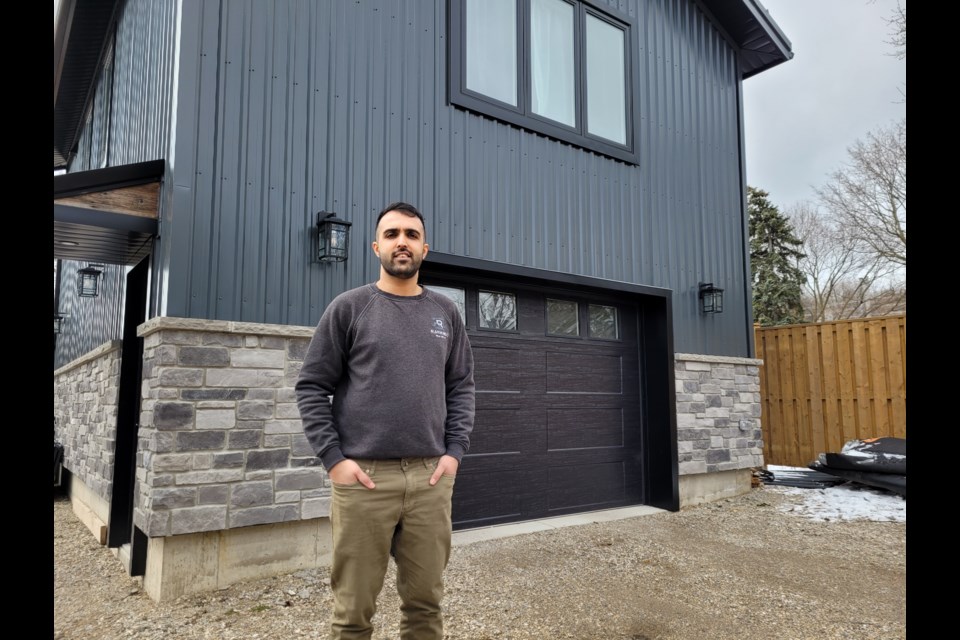Companies in Guelph are channelling their efforts to find answers to the housing crisis.
With the cost of living steadily climbing, a new home is out of reach for many potential home buyers.
To increase housing supply and density, the province mandated secondary dwellings be allowed in 2020, and since then, tiny homes have increasingly become an alternative housing option.
Bobby Randhawa, founder of Ranardo Real Estate, a company that specializes in building tiny Homes in Guelph, recently converted an existing garage into a 350 sq ft apartment at 239 Liverpool St.
“We are working on our fifth project this spring. I can't think of a more affordable and sustainable way of creating more housing in the city than with something like this, converting garages into tiny homes.”
But Randhawa said, more recently, his family run business is doing more than just garage conversions.
Tiny homes can be detached and custom-built to suit any budget and taste.
“People often think, oh no! A tiny home! They think it’s a box, it’s cheap, and modular. But what we do is custom. All buildings are different and unique,” Randhawa said.
Since hosting an open house at the Liverpool St. location, Randhawa says feedback from the community has been positive.
“A lot of neighbours were initially against tiny homes, but when they came and saw, they were happy and are now thinking about having one themselves,” he said.
Ranardo Real Estate has experience in land development, renovations, and new construction. The company designs, renders, manages, and builds projects from start to finish.
Randhawa says tiny homes are an excellent way to improve the value of a homeowner’s property and can offer a sustainable and affordable solution to increase the housing supply.
“We are currently working on our fifth project, on Morris Street for my neighbour. We are building a tiny home in the back. My wife and I did the same with our house. We built one out back as well,” Randhawa said.
“I think working with clients, seeing their vision, drawing up 3D models, and then seeing it come to life, it’s exciting to see how happy they are.”
Cabin Office Co., in Guelph has also shifted its focus to building custom, turnkey, backyard homes.
The company creates custom, move-in ready accessory dwelling units with a core purpose is to create flexible living spaces that include backyard homes for loved ones to age in, living spaces for adult children, or investments.
“We started off building offices and small studios and the demand fell off. So, last year, we pivoted to basically just doing accessory dwelling units, small homes in people’s backyards,” said Cabin Office Co. founder, Steve Reid.”
“We’ve done about 12 of them now. And that’s now become our primary focus.”
Since starting the business four years ago, Cabin Office Co. has expanded with more staff to serve Hamilton, Kitchener-Waterloo, and the GTA.
“We got a shop, started prefabbing the builds in it, and we use a crane to lift them into our customer’s yard. The farthest we have sent one so far is in Newmarket,” Reid said.
“When Guelph changed the zoning bylaw to allow accessory dwelling units at the end of 2020, we got a call from someone who said we really like what you do. We would like one, and we would like it to be a house. So, we built the first permitted accessory dwelling in 2021.”
Since then, the demand continues to rise.
“This is a good solution because land has become so expensive that those who are fortunate to have a yard, have an opportunity to create a second house, either for themselves, their aging parents, or for their grown kids because house prices are so crazy. And we are seeing more of that today, these multigenerational builds. These consist of about two thirds of our projects,” Reid said.
“From a rental point of view, it’s an opportunity to add more rental stock too, which is also why the price of rentals is so high. There’s just not enough of them.”
Reid’s background wasn’t always construction related.
“I’m a structural engineer so I always did office jobs. I worked from home in 2020 like most of us, and I just didn’t have a good space to work. Carpentry for me was always a fun weekend thing to do. So, I just got this inspiration to create something in the backyard that didn’t need a building permit. That’s the generation of it all,” Reid said.
“I did discover a real entrepreneurial streak in myself, and it turned it into, wow! The market is there, let’s pivot. So, now here we are, a general contractor specializing in backyard houses.”



